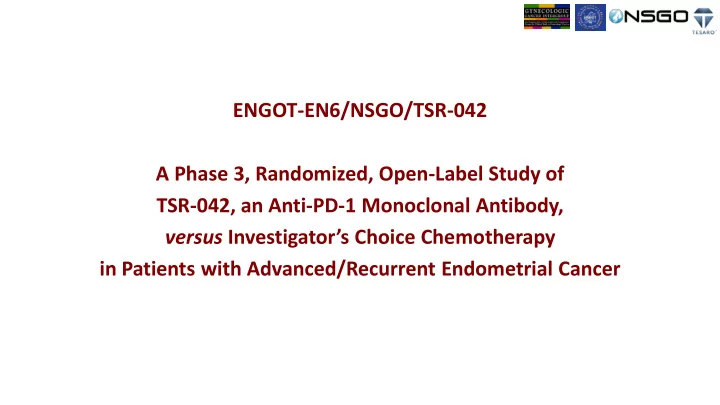

ENGOT-EN6/NSGO/TSR-042 A Phase 3, Randomized, Open-Label Study of TSR-042, an Anti-PD-1 Monoclonal Antibody, versus Investigator’s Choice Chemotherapy in Patients with Advanced/Recurrent Endometrial Cancer
Prevalence of somatic mutations across cancer types Alexandrov, et al. Nature 2013
TSR-042 (Anti-PD-1 antibody) ➢ TSR-042 is an immunoglobulin G4 (IgG4) humanized ➢ TSR -042 demonstrated anti-tumor activity in a xenograft monoclonal antibody (mAb) that binds with high affinity model in humanized mice. to PD-1, resulting in inhibition of binding to PD-L1 and PD-L2. ➢ Ongoing clinical trial of TSR-042 has been expanded to enroll patients with metastatic microsatellite instability high (MSI-H) endometrial cancer who have progressed following one or two prior chemotherapy treatments EORTC Annual meeting 2016 H Laken et al
Clinical Activity of Anti-PD-1 antibody In Endometrial Cancer Data from pembrolizumab study *Data from pembrolizumab study in 2L MSI-H endometrial cancer in 2L MSS patients – Previously treated endometrial cancer patients whose – Previously treated endometrial cancer patients tumor had PD-L1 expression were dose with were dosed with pembrolizumab at 10 mg/kg pembrolizumab at 10 mg/kg Q2W Q2W – ORR = 13% (3/23), Median PFS: 1.8 months – Nine patients with MSI high recurrent uterine – Median OS: not reached cancer enrolled with 100% having endometrioid histology – Objective RR at 20 weeks was 66.7% (2 CR, 4 PR, 1 SD and 2 patients progressed) and Immune- related PFS at 20 weeks was 77.9% – 6/9 patients remain on study drug beyond 50 weeks Fader et al, SGO 2016 #5581: Ott et al, Pembrolizumab in Advanced Endometrial Cancer: Results from the Phase 1b KEYNOTE-028 Study *MSI status of responders are not reported but 1 patient with confirmed MSI high had PD as best response.
TSR-042 in Endometrial Cancer Primary objectives: • To evaluate progression-free survival (PFS) in patients with advanced/recurrent endometrial cancer with microsatellite instability high (MSI-H) tumors treated with TSR- 042 compared with Investigator’s choice single -agent chemotherapy based on Response Evaluation Criteria in Solid Tumors version 1.1 (RECIST v1.1) confirmed by independent central review (IRC) • To evaluate overall survival (OS) in patients with advanced/recurrent endometrial cancer with microsatellite stable (MSS) tumors treated with TSR- 042 compared with Investigator’s choice single -agent chemotherapy • To evaluate the safety and tolerability of TSR-042 in the MSI-H and MSS cohorts
TSR-042 in Endometrial Cancer Secondary objectives: • Objective response rate (ORR) as assessed by RECIST v1.1 based on the Investigator’s assessment in the MSI -H and MSS cohorts • Duration of response (DOR) in the MSI-H and MSS cohorts • OS in the MSI-H cohort • PFS based on the Investigator’s assessment in the MSS cohort • Change from baseline in patient-reported outcomes (PROs) EORTC QLQ-C30, EORTC QLQ-EN24, EQ-5D-5L
N = 580 Recurrent Endometrial Cancer MSI test Randomization 1:1 MSI-H Microsatellite instibility high n = 130 1:1 Randomization Physician’s TSR-042 choice q 3 wkly chemotherapy Primary End-Point: PFS Crossover to TSR-042
N = 580 Recurrent Endometrial Cancer MSI test Randomization 1:1 Randomization 1:1 MSI-H MSS Microsatellite instibility high Microsatellite stable n = 130 n = 450 1:1 Randomization 1:1 Randomization Physician’s Physician’s TSR-042 TSR-042 choice choice q 3 wkly q 3 wkly chemotherapy chemotherapy Primary End-Point: PFS Primary End-Point: OS Crossover to TSR-042
TSR-042 in Endometrial Cancer MSI testing: Local MSI testing results performed in certified labs can be used for enrollment. When local MSI tests are not available, central MSI testing must be completed prior to randomization. The MSI test results used for cohort assignment will be used for efficacy analysis. Tumor samples will be collected from all patients for retrospective central MSI testing by next-generation sequencing.
TSR-042 in Endometrial Cancer Experimental Regimen (IMP): TSR-042 500 mg IV Q3W for the first 12 weeks followed by 1000 mg TSR-042 IV Q6W for the remainder of the study. Physician’s Choice Single Agent Options: Paclitaxel 175 mg/m 2 IV Q3W Pegylated Liposomal doxorubicin 40 mg/m 2 IV Q4W Bevacizumab 15 mg/kg Q3W
TSR-042 in Endometrial Cancer Duration of treatment: Subjects receiving TSR-042 may continue for up to 2 years or until disease progression, unacceptable toxicity, patient withdrawal, Investigator’s decision, or death. Continued treatment with TSR-042 beyond 2 years may be considered following discussion between the Sponsor and Investigator. Subjects receiving Investigator’s choice single -agent chemotherapy may continue until disease progression, unacceptable toxicity, patient withdrawal, Investigator’s decision, or death.
TSR-042 in Endometrial Cancer Main Inclusion criteria: • Histologically or cytologically confirmed advanced and/or metastatic EC. All endometrial cancer histologies are allowed except endometrial sarcoma • Up to 2 lines of previous systemic therapy. Prior hormonal treatment is not considered a line of treatment in any setting • Documented radiological evidence of PD per RECIST v1.1, (For MSI-H patients, the presence of measurable lesion(s) must be confirmed by central radiology review prior to randomization. • A formalin fixed, paraffin-embedded (FFPE) tumor tissue block or unstained slides (archival or freshly obtained) must be available for determination of MSI status. • ECOG performance status of 0 or 1 • Patient has adequate organ function
TSR-042 in Endometrial Cancer Sample size considerations: Parameter MSI-H MSS Primary endpoint PFS OS HR (median: control vs. TSR-042) 0.5 (4.5 vs. 9) 0.7 (10.5 vs. 15) Randomization 1:1 1:1 α (1-sided) 0.025 0.025 Power 0.9 0.9 Accrual period (months) 27 25 Follow-up (months) 5 15 Interim analysis None 80% events
Recommend
More recommend